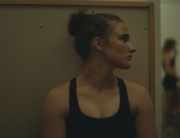
Charm City Kings plunges audiences into Baltimore’s frenetic dirt bike scene. Based on the 2013 documentary 12 O’ Clock Boys, the film is a coming-of-age story about 14-year-old Mouse, who joins a clique of outlaw dirt bikers. It’s shot in gritty cinema-vérité style, following Mouse day-to-day as he tries to gain clout, hook up, and make ends meet for his single working-class mother and younger sister. The story is a rehash, but the talent behind the film is refreshing, and the movie pulsates enough to give it an unexpectedly novel flare.
As Mouse, Jahi Di’Allo Winston gives off a boyish clinginess that feels sweet and natural, especially in scenes when he tries to woo his more confident crush, Nicki (Chandler DuPont). Throughout, Mouse’s inner conflict is split between two opposing father figures. The first, Det. Rivers, played with swaggering street smarts and weary tenderness by Will Catlett, embodies Mouse’s conscience for taking the straight path. The second, Blax, who’s around the same age as Det. Rivers, is the towering leader of the biker clique, and he represents Mouse’s yearning for the outlaw path. The contradictory Blax is played with soft-spoken subtlety by the well-cast Meek Mill. In one moment, Blax’s threatening to blow the brains out of those who wronged him, and in another, he’s a warm but disciplinary big brother.
The cinematography also adds a whole layer of beautiful outlaw-ish chaos. In one of the most memorable sequences, Mouse and his boys attend a First Sunday of the Summer festival, where urban dirt bike dwellers from all across Baltimore’s west side congregate to show off their elaborate tricks. As Mouse navigates through the crowd of onlookers, cinematographer Katelin Arizmendi’s camera follows them in sweeping-pan fashion, surveying the bustling and chaotic city landscape that culminates in an electrifying cop chase.
All this talent does a lot to mask the narrative weaknesses, which sometimes rely on cathartic low-hanging fruits—there are some cinematic tropes that never fail to tug on the audience’s heartstrings, and thus are cheap. At times, the writers’ use of these tropes feels like a cop-out. Part of this could be over-editing, as if the film’s story had gone through multiple revisions to possibly appeal to a wide audience.
Charm City Kings could have taken it one step further, letting those whom this story is based on to let their voices shine more thoroughly and loudly—so much more dialogue and backstory could have been given to the other biker outlaws, for instance, which would’ve given the movie a more macrocosmic scope. Regardless, viewers may find much to appreciate in its visceral biking sequences and fresh, talented cast.
















Leave A Comment